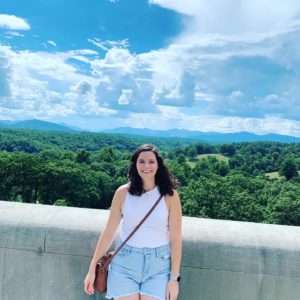
Lauren Nale (M.S. in occupational therapy, ’16) was born and raised in the south suburbs of Chicago, Illinois, where she currently lives and works as an occupational therapist. To learn more about Nale and her current position, read her interview below.
Describe your current position and some of the responsibilities that come with it.
I am an occupational therapist at a day rehab facility. My job is to evaluate, treat, and discharge plans for patients with the goal of improving their ability to participate in their daily activities. Besides actual treatment, a big part of my job is patient and family education and training, emphasizing the importance of home exercises, including strengthening and practice of things like dressing and meal preparation in order to reinforce and improve what patients are working on in therapy.
How has COVID-19 changed operations for your organization, and how are you responding to it?
A lot of patients initially decided to not pursue day rehab services due to COVID-19, and now patients are finally coming back and resuming services. Because of the delay in their rehab, patients we are seeing are more deconditioned or have new problems (e.g., shoulder subluxation, pain, etc.). When seeing patients, we are trying to maintain social distancing, and all patients and therapists are wearing masks. We are also asking patients if they have any shortness of breath or coughing and then taking their temperatures every day when they come in. We have to sanitize and clean everything patients touch, which is taking up a lot of extra time. COVID-19 has also made it more difficult to work with patients’ families and caregivers because they are not allowed in the facility except to drop off patients, so communication and training have been disrupted.
Why did you decide to pursue your current career path?
I recently started this job at day rehab because it is mostly neurological impairments that are treated, and I see neurological impairments as being the most difficult to treat. I enjoy a challenge and like to learn, and I also think it is an extremely rewarding area of injury/disability to treat.
How have your education and experiences at CSU helped you in your career?
Occupational therapy is such a broad field, and you can work in a lot of different settings, but being in the occupational therapy program at CSU made me realize what I wanted to focus on in my career— working with adults with neurological injuries and impairments. I feel that because of my education at CSU, I have the foundation needed to be the best OT I can be for my patients. I look to research to guide my practice, and I use the philosophy and theory of the importance of re-introducing meaningful activities into my patients’ lives. Just thinking about my time at CSU reinvigorates my passion for what I do and for being a life long learner.
Which faculty member in the College of Health and Human Sciences inspired you most?
Karen Atler was the professor who, by far, inspired me the most. Her passion for occupational therapy emanated from her and onto each of her students every lesson, and she has an amazing way of making her students feel empowered. She is a professor who doesn’t just feed you facts, but truly gives you the tools to critically analyze, reflect, and grow. She is a very special person, and she treats all of her students as individuals, shows them respect, and she makes you feel like you’re voice is important. This is not something I have seen in many professors, and she still positively impacts me as an occupational therapist today.
What advice do you have for students looking for a full-time job in your field?
Keep looking! There are a lot of positions available, so don’t settle until you find something that is a good fit for you. We work too hard to be unhappy or unsatisfied with our careers.
The Department of Occupational Therapy is a part of CSU’s College of Health and Human Sciences.